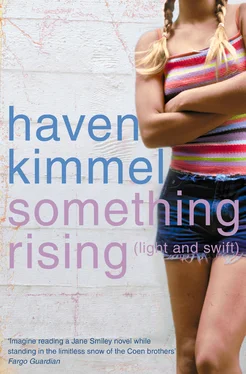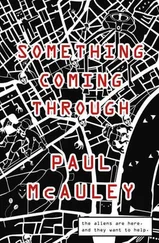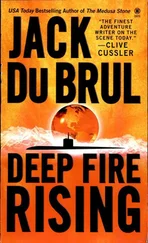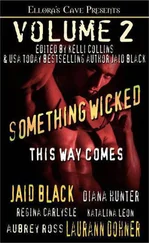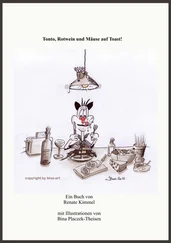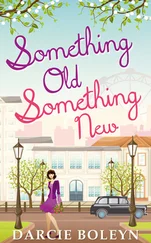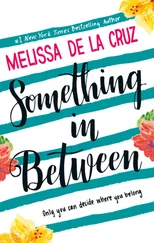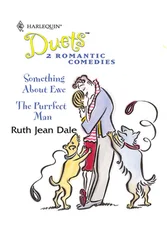“I’m not,” Cassie said, studying the field across the road.
“Did Poppy come by? Laura wants to make sure he got some coffee.”
“He’s out on his walk.”
“That doesn’t tell me if he had any breakfast or coffee.”
Cassie turned and looked at her sister; Belle’s outline behind the screen was ghostly. Her thin arms were crossed over her stomach.
“Edwin will be here soon,” Belle said, glancing at her wrist as if a watch were there. But there was no watch.
Cassie looked off down the road, back at the screen door, Belle was gone. She was right—soon Edwin Meyer would appear, because he’d bought the hardware store from Poppy and felt it was his duty to check in every day, and because Edwin and Poppy were best friends in the way that duty binds. In the kitchen Belle and Laura, Cassie knew, were already working out the morning in silences and gestures that operated like a code Cassie couldn’t crack. It was another summer day, and all things considered, Cassie lived in a predictable house, and none of it mattered if Jimmy didn’t come home. She moved out to the cement steps at the edge of the driveway. She waited.
They came walking down the road with a purpose. Cassie lived in the flattest part of a flat state and could see them coming from a great distance, Leroy Buell and his foster sister, Misty, who lived at the end of the King’s Crossing in a tumbledown house with what Laura called a Plague of Relatives. The house was in bad shape, but Leroy ‘s aunt Betta, who was crazy in all other ways, knew how to step outside the front door and throw a handful of seed at exactly the right time, so that everywhere you looked around their house, all along the sagging fence and covering the old walkways and right up against the dead trucks and cars and tractors, were flowers . No one tended them, no one planted or fertilized, but Laura said the Buell’s house was like the virgin prairie, only crazy. Leroy was actually born there, but Misty was an addition, a child taken in a few years ago from the county home who pretended she had been adopted, so fiercely did she wish it to be true.
Leroy and Misty sent up the alarm in all God-fearing normal people. God-fearing normal people meant nothing to Cassie, who would happily take their names and kick their asses, as Jimmy was fond of saying. The only way to be safe in the world, as Jimmy would have said, was to be the person other people feared, this is the law of the jungle and among all thinking organisms, and just because we have been given the capacity to imagine it might not be so, or to hope there might be another, more enlightened way to live, is no reason to deny that it is so. Trouble , he liked to begin a story by saying, it is widely known .
“Going down the river to the shack, cook up a mess of frogs,” Leroy said without preamble when he and Misty reached Cassie’s horseshoe-shaped yard.
“Build a fire,” Misty said.
Leroy had his right thumb hooked in a belt loop of his jeans, which were six inches too short, while his left hand drummed against his bird chest. He was too skinny, his face too long, he breathed through his mouth with a sound like a train in the distance. Misty stood stiff next to him but couldn’t seem to stop making noise. This happened in school, too; sometimes if the room was quiet, Cassie could hear Misty two rows over humming the theme song to a television show called Run, Joe, Run . She whistled and whispered, snapped her fingers to a hectic beat. But worst of all, Misty was driven toward sound effects, and if she’d been able to hear Cassie think of the faraway train, she would have said: Chug-a-chug-a-chug-a . A high wind: Whooooooooo . A catfight: Yowwwwwl, screeech , etcetera. Laura would have said there was no future in such behavior.
Cassie gave Misty a good hard look. Her hair was straight as a poker, cut jagged at the edges near her shoulders, and with bangs made crooked by a cowlick. Her teeth didn’t meet up right, and she smelled of trapped smoke. Her clothes, a striped shirt too big and blue pants too small, had obviously come from the charity box at the Church of Christ, and Cassie thought it no wonder Misty’s parents had decamped for points unknown.
Cassie stood, stretched herself out, then went inside for her backpack, which had been Jimmy’s long ago when he had mistakenly thought himself a Boy Scout. This was a mystery to Cassie, how the true nature of a person can be so thoroughly concealed in youth that he does humiliating things. It meant Cassie herself could do them, and later someone would hold out the offending object—a dress, a party favor, an unsent letter—and convict her. She was trying to redeem the backpack. She carried in it a Swiss army knife, a compass, a box of waterproof matches, a second box of waterproof matches, a rain poncho, an old snake bitekit, a small flashlight, a harmonica she couldn’t play, a worn guide to dressing field injuries. Now she added a ball-peen hammer—a regular hammer was too heavy to carry—and a small box of nails; boards were always popping loose on the shack, and if she left it to the inbreds and malcontents, as Jimmy called them, the shack would fall down around their ears and they’d go right on sucking the heads off crawdaddies. She also added a second chocolate milk, knowing that everyone down at the river would want it but be afraid to ask; this was the sort of gesture that kept everyone clear about who stood where. Cassie was the person with the chocolate milk and the hammer in her hand, that was all they needed to know.
The three trudged down the road, then cut across the field on Cassie’s side, away from the infernal hum of the power lines. “Them new kids is gonna be there,” Leroy said. “Emmy Somethin’ from Kentucky, and Bobby Puck from up that Granger School that closed.”
Misty made a puck-puck-puck sound.
“I met ‘em already. They was down at the river two days ago when I got there, “ Leroy continued. “I says, ‘How’d you find this shack? It belongs to us and Cassie Claiborne.’ Then that Bobby Puck said something, didn’t make any sense.”
Cassie watched where she was walking, watched for the shimmer of a cottonmouth or the frightened streaking-past of a vole. She could remember when this walk back to the river seemed to take all day. If someone had asked, she would have said the water was miles from her house, but she’d learned it wasn’t even a single mile, maybe only a half. As they approached the edge of the field, she recalled an afternoon she and her parents and grandparents had taken a picnic on the bank, and as they’d reached this point, right about here, Jimmy had swung her up on his shoulders and asked, Do you smell the water? There had been only that once when they were all together here, walking this path, it was before Buena Vista had gotten sick; and Cassie could see, too, that there was hope and faith in the gesture of a picnic that had somehow gone sorely lacking. If she had tried to plan one, Laura would have scoffed, and Belle would have said she didn’t like the river, she couldn’t stand bugs, or maybe even nature itself for all Cassie knew. But whatever complaints they leveled wouldn’t have much relationship to what they meant, which was: that’s all over now.
Cassie smelled the water. As they got closer, she could hear splashing, loud talk, and laughter. A girl said, “You know you’re going to kill them.”
“I won’t! I’m making them happy!”
Leroy lifted a branch and Misty and Cassie walked under. The morning sun hit the water in patches of brilliance; some places were shaded by the tangle of trees overhead. This was a green place, and of ever changing light. The new girl was floating in the river, which was low, in a pair of blue-jean shorts and a Mickey Mouse T-shirt, her arms outstretched and her dark hair floating out behind her. A fat boy was sitting on the bank on top of a fivegallon bucket. Presumably the frogs were in the bucket, and he was making them happy.
Читать дальше
